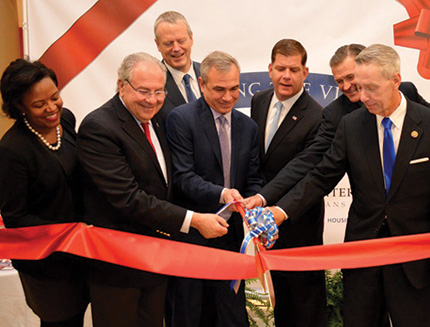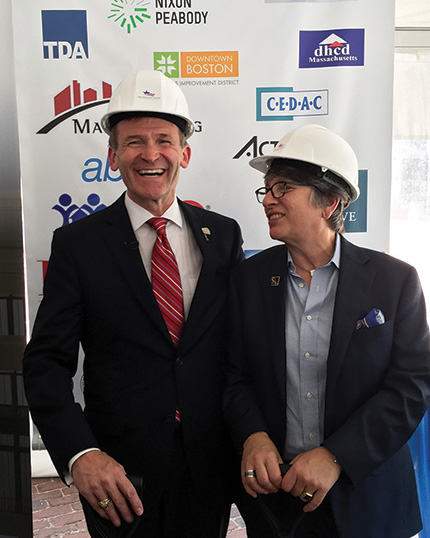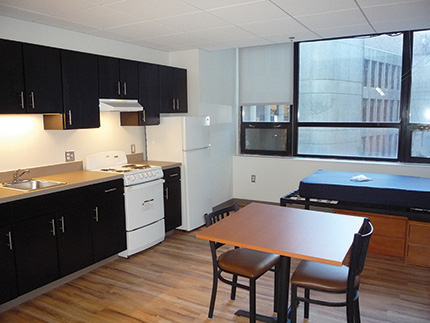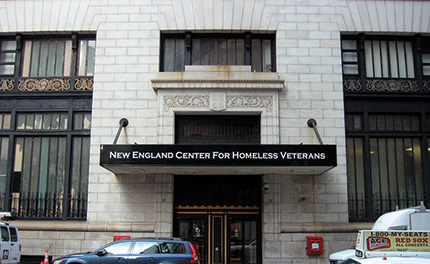
governor Charles Baker; chair, NECHV board of directors Joseph Albanese;
mayor Martin Walsh; NECHV president and CEO Andy McCawley;
and congressman Stephen Lynch.

Jennifer Pinck, founder and president of Pinck & Co.

that would help residents feel at home -- whether their stay was
temporary or permanent. The reconfiguration provided
37 new permanent apartments and 180 new beds
for transitional housing -- including a separate and secure dormitory for females.

Center and Home for Veterans announced the name change to
“better reflect the mission of the center and its role in the city’s
initiative to end chronic veteran homelessness.”
Boston, MA After three years of planning and two and a half years of construction, the New England Center and Home for Veterans (NECHV) held a ribbon-cutting ceremony marking the completion of the facility’s $35 million reconfiguration and renovation on 17 Court St.
Pinck & Co. was project manager for the extensive renovation, working with architect Tise Design Associates and construction manager Consigli Construction to provide the center with 37 new permanent apartments, 60 renovated units, and 180 new beds for transitional housing -- including a separate and secure dormitory for females. Approximately 65,000 s/f of newly renovated space was created for education, employment, clinical, housing, and critical support services.
NECHV president and CEO Andy McCawley said when he approached Pinck & Co. with the idea to expand the facility, their team proposed several innovative solutions. They conceptualized a larger, more inclusive project scope that would address the center’s complex construction challenges while reconfiguring the facility to best incorporate housing, living spaces, programs, and services. Pinck & Co. also helped identify state and federal funding resources, which made the complete renovation possible.
“This incredible transformation of our center provides far-reaching resources and opportunities that will provide immediate- and long-term care, enable successful independent living and meaningful employment, and serve veterans for the rest of the 21st century,” said McCawley. “We created and finalized a vision.”
Jennifer Pinck, founder and president of Pinck & Co., said the biggest challenge of the project was maintaining the day-to-day services for the 300 veterans in permanent or transitional housing. “This was an extremely complicated job, especially when it came to construction staging,” she said. “The NECHV operates 24/7 to provide services, food, housing, medical care – so maintaining the operations at all times was essential.”
The NECHV site is comprised of two adjoined buildings: the four-story Old Colony Trust Company Building, constructed in 1908, and a 10-story addition that was built in 1925. This presented another challenge: maintaining the historical integrity of the building.
“The project was financed, in part, by state and federal historic tax credits, which required us to preserve the historical elements of the building,” said Pinck. She also pointed out the project required the use of green construction methods, resulting in a sustainable and energy-efficient facility.
Structural and building repairs and improvements were also needed throughout the center. This included upgrading and adding elevators; new sprinkler, plumbing and fire alarm systems; extensive electrical and mechanical upgrades, and modifications to make the building handicapped accessible.
“We are honored to have made this important project possible for the veteran community,” said Pinck. “Through the NECHV, more than 1,000 veterans each year receive a wide range of critical supportive services and life skills training. For those who are at risk for homelessness, this is their lifeline.”
.png)






